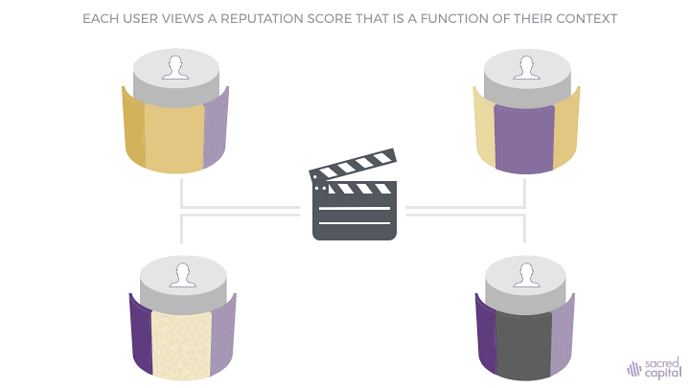Dear @lynnfoster , dear @sidsthalekar ,
If an “vf:EconomicResource” is defined as “a resource which is useful to people or the ecosystem” (in VF description) and only “when it is bound by materiality” (in the words of Sid), then I want to challenge you both with a few Sunday morning thoughts.
I agree with the usefulness of an economic resource, but I don’t agree it is only bound by materiality.
Lynn also said about reputation: “but I think that is different than being a resource in its own right, something that can be used, consumed, traded, given away, etc.”
Let’s be clear: reputation is not the “reputation score” which can be used, but not consumed, not traded and not given away. The fact that the reputation score can be “used” in economic activity makes it an economic resource in my view.
I don’t question that both reputation and reputation score are bound to one identity and only has value to that one identity, as Arthur Brock says in his blogpost, and thus trading makes no sense. To stay with Arthur’s example, the electricity is the reputation score, the magnetic field is the reputation, and as we all know the first is an economic resource.
I absolutely agree with Arthur that building a reputation - and the score to derive from that activity - requires a lot of transactions, a chain of relationships. If I have a (verifiable) claim from my diploma as MD or lawyer, that is just a starting point to be able to build these types of reputation chains, but off course it is through many positive interactions with patients/clients that I build my reputation. Only those involved in the interactions are able to make an assertion about me and can add to my reputation score.
No doubt about that and concretely, using the DPKI identity on Holochain is crucial to connect to vf:Agents in HoloREA. In which direction is a privacy concern in case of foaf:Person, but that’s another discussion, but this is very important at least in Europe (with GDPR), and soon in Brazil, California, etc. When a reputation score is bound to the identity of a person, then in GDPR regulation, this reputation score becomes personal data. It always has been, but now it is much stronger protected by law.
The same is true for any type of data that is derived from the behaviour of a person, wherever it resides doesn’t matter, it becomes personal data. Does anybody doubt that personal data is an economic resource? Ask Google or Facebook.
But the score that comes out from building the reputation chain, can be modeled as an economic resource and can “used” in an economic event that is part of a process that generates another economic resource. I’m talking here in VF language. That is the only point that I want to make. And it is totally immaterial.
An example:
I can write an article in some kind of community (eg. Reddit), but if I have not a high enough reputation score on the topic, I can’t publish it and not receive some current-see in return. So the input to this process - of publishing the article - are both the reputation score and the article. The reputation score is like the electricity driving a machine producing an intellectual/digital product. I can definitely model it in VF language :).
This example still has some kind of material ring to it, as it produces a digital product, but many examples can be given in which there is no material or intellectual property. What is oral consulting, coaching, healing, advising more than a bunch of words - in some cases even words are not needed, in case of a guru - thrown in the air, but they are considered for sure as economic “services” in Value Flows and any other economic language.
We can be very creative on the type of “rating” that people give in return of a service, that rating itself is an economic resource, a value expressing the usefulness of the service received.
This “rate” can be a symbol on a website expressing a reputation, but it can also be the 2000 Euro paid to a business lawyer or both combined as outcome of the same process.
It is exciting to me that this sort of value flows can be designed in VF and soon be used on HoloREA …
I think it’s time to make these intellectual services much more “explicit” with VF and HoloREA.


 I’m also open to us adhering to a shared vocabulary so we’re not mis-interpreting each other.
I’m also open to us adhering to a shared vocabulary so we’re not mis-interpreting each other.